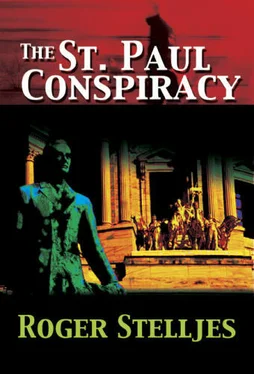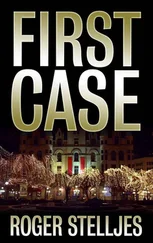Roger Stelljes - The St. Paul Conspiracy
Здесь есть возможность читать онлайн «Roger Stelljes - The St. Paul Conspiracy» весь текст электронной книги совершенно бесплатно (целиком полную версию без сокращений). В некоторых случаях можно слушать аудио, скачать через торрент в формате fb2 и присутствует краткое содержание. Жанр: Триллер, на английском языке. Описание произведения, (предисловие) а так же отзывы посетителей доступны на портале библиотеки ЛибКат.
- Название:The St. Paul Conspiracy
- Автор:
- Жанр:
- Год:неизвестен
- ISBN:нет данных
- Рейтинг книги:4 / 5. Голосов: 1
-
Избранное:Добавить в избранное
- Отзывы:
-
Ваша оценка:
- 80
- 1
- 2
- 3
- 4
- 5
The St. Paul Conspiracy: краткое содержание, описание и аннотация
Предлагаем к чтению аннотацию, описание, краткое содержание или предисловие (зависит от того, что написал сам автор книги «The St. Paul Conspiracy»). Если вы не нашли необходимую информацию о книге — напишите в комментариях, мы постараемся отыскать её.
The St. Paul Conspiracy — читать онлайн бесплатно полную книгу (весь текст) целиком
Ниже представлен текст книги, разбитый по страницам. Система сохранения места последней прочитанной страницы, позволяет с удобством читать онлайн бесплатно книгу «The St. Paul Conspiracy», без необходимости каждый раз заново искать на чём Вы остановились. Поставьте закладку, и сможете в любой момент перейти на страницу, на которой закончили чтение.
Интервал:
Закладка:
Lindsay did two things that made PTA grow. First, at the time of his arrival, the company had started developing satellite technology for commercial use, in particular for satellite television. Lindsay understood its potential application to intelligence gathering. He was fully aware of the CIA’s movement towards the reliance, if not flat out dependence, on satellites for intelligence gathering. He leveraged his contacts and obtained a large chunk of the CIA’s business for PTA. Not long after, he was able to work his way into the NSA as well. PTA became intertwined in the overall defense of the country. It had led to a three-fold increase in their governmental work.
Second, he took the company’s expertise in software, communications and satellite technology into retail. The company was the first company to offer walkie-talkie ability with cell phones. Some of the first personal digital assistants (PDAs) came from PTA. PTA offered one of the first combination cell phone/walkie-talkie/PDAs. One could buy their products at Best Buy, Circuit City, and Sears. It was a name brand.
After two years and even before the company’s aggressive move into retail markets had taken off, Lindsay had been looking for a big increase in pay. Given what he’d done with the company in his two short years, he felt entitled. He was disappointed with what the company offered. A decent raise and an increase in stock options helped but was nowhere near what he’d expected. He wanted to, expected to move into the big leagues of executive compensation. However, the board of directors had been disturbed by stories about high executive pay at prominent corporations. They did not want criticism in that regard coming their way, especially given how much of the business was based on government contracts. Taxpayers would not be happy to learn that their tax dollars paid a president and CEO ten million dollars, plus stock options and it wasn’t enough. Lindsay would have to take what the board was offering.
Lindsay started to look around. Through intermediaries, he learned of potential openings and interest in his abilities. He arranged for that interest to leak to the media. He expected the board would then sweeten his compensation, not wanting to lose the one person who had raised profits and stock prices to new heights. The board, knowing a media leak and power play when it saw one, played hardball and put together their own list of potential replacements and leaked that to the media. Lindsay seriously considered walking.
Then Cross came along.
Lindsay had worked his way up through the CIA over twenty-five years, with his last ten years spent as the deputy director of Operations (DDO). That made him Alt’s boss. Alt worked as an intelligence officer. Supposedly, after the Church hearings in the 1970s, the CIA was out of the assassination business. That wasn’t entirely the case. Alt, and a number of others now with PTA had worked wet operations for years for the CIA. That was how Alt met Bouchard-some joint activities with the French. Lindsay had ordered assassinations and other operations, with Alt integrally involved in many of them. When Lindsay went to PTA, he wanted to significantly upgrade the security at the company. He brought in Alt for that very purpose and made him a vice president. Another person Lindsay brought to the company was CIA numbers genius, James Stephens, naming him chief financial officer.
After two years, when Lindsay was just about ready to walk away from PTA, Stephens and Alt came to him with Cross.
The increase in governmental contracts in Lindsay’s first couple of years necessitated that the company go into an expansion, acquisition and hiring mode. Their facilities were tapped out for space and efforts were made to create as much room as possible to fulfill the contracts. New facilities would be built, but that took time. In the meantime, the company had to ramp up its operations immediately, and they were short of space.
James Stephens had been tasked with evaluating each facility, its equipment, capacity, viability and needs. Stephens found that at many company facilities there was an abundance of surplus military hardware and equipment, leftovers from previously fulfilled government contracts. It had simply been stored and nobody knew or had ever decided what to do with it. It was largely unrecorded on the company books. Stephens mentioned the surplus to Alt, who in turn started to formulate an idea.
PTA had one facility that was underused. It was an old explosives manufacturing facility outside the small rural town of Cross, West Virginia. Cross was the official address, but given the inherent danger of an explosives manufacturing facility, it was located well outside of the town, completely isolated. It was a facility that had fallen into disrepair, and it was about to be shut down. However, the one thing Cross had, that other PTA locations didn’t, was space, and in particular, two empty warehouses. So the decision was made to ship all surplus equipment and materials to Cross. Once there, the company would decide what to do with it all. This is where Stephens and Alt came in with their idea.
Alt, Bouchard, and a few others knew select people with serious money who would jump at the chance to acquire the surplus material. Why? Because these were groups that the Unites States government did not want to have U.S. military weaponry and equipment. Some were arms dealers. Others were labeled terrorist groups. Still others were in the drug trade, particularly in Columbia. And still others were simply viewed as unfriendly to the U.S. government. They couldn’t come to the states and purchase this equipment. However, if the powers that be at PTA were willing to do a little under-the-table dealing, these people would overpay to get their hands on the arms, explosives, and communications gear collecting dust in a remote Cross, West Virginia, warehouse
Alt and Stephens projected what the take might be. Lindsay said go ahead, “As long as I always get a third,” and none of the records included his name.
Alt and Bouchard arranged for the sale and transport of the surplus equipment. They always mixed it up, careful not to get into a pattern for shipment. Sometimes ships were used. A little money to the right stevedore and shipline assured that the goods reached their destination. Other times, the PTA jet had been used, as it had been traveling the globe for legitimate business. A few extra crates in the cargo hold wouldn’t raise suspicion. On other occasions small boats had been used, either out of Chesapeake Bay or down on the Gulf Coast.
And while PTA was making millions selling electronic and surveillance equipment to the CIA, Alt, Bouchard, and others made sure the electronic and surveillance equipment didn’t trip up the Cross operation.
With the CIA having moved mostly to electronic and satellite surveillance, the agency didn’t have the troops on the ground that they used to. Alt and company took advantage of that weakness. The equipment was always transported in small quantities. Contact was made with the groups through intermediaries. There was no paper or electronic communication ever. Only face-to-face meetings and only cash was exchanged for the equipment. There were no records, except for those kept by Stephens, who moved the money around to prevent its detection, setting up overseas accounts for all involved, under assumed names.
While the original surplus had been older military equipment, as time went on, more current and advanced arms, weaponry, and communications equipment found its way to Cross. While the previous surplus had been accidental, more intentional surplus was created and sent to Cross, where Alt would arrange for its sale. While this made Lindsay, Alt, and Bouchard a little uncomfortable, the money made it worth the risk. And Lindsay, always one to cover all the bases, had a few contacts at CIA who liked a little side cash, especially when placed in an account somewhere overseas. They would let Lindsay know if the sales were detected. They never had been. For five years, it had been a sweet little operation.
Читать дальшеИнтервал:
Закладка:
Похожие книги на «The St. Paul Conspiracy»
Представляем Вашему вниманию похожие книги на «The St. Paul Conspiracy» списком для выбора. Мы отобрали схожую по названию и смыслу литературу в надежде предоставить читателям больше вариантов отыскать новые, интересные, ещё непрочитанные произведения.
Обсуждение, отзывы о книге «The St. Paul Conspiracy» и просто собственные мнения читателей. Оставьте ваши комментарии, напишите, что Вы думаете о произведении, его смысле или главных героях. Укажите что конкретно понравилось, а что нет, и почему Вы так считаете.












